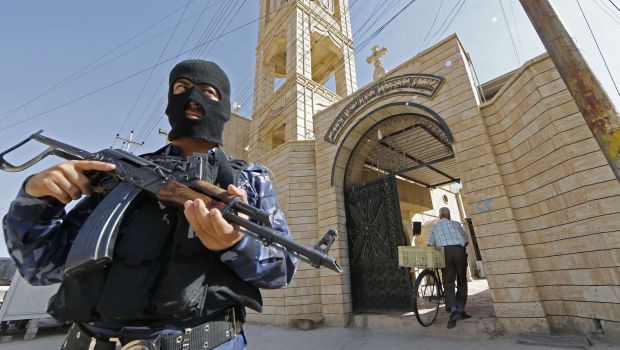
An Iraqi security officer, stands guard outside the Church of the Virgin Mary in the northern town of Bartala, on June 15, 2012, east of the northern city of Mosul. (AFP Photo/Karim Sahib)
Baghdad, Asharq Al-Awsat—“There have been attempts to smuggle a number of rare Iraqi manuscripts from a number of libraries in Mosul to Turkey, including a rare Qur’an which dates back to the Abbasid era,” the head of Iraq’s State Board of Antiquities and Heritage, Qais Hussein, told Asharq Al-Awsat.
Hussein said that “relevant authorities in the Iraqi government will take charge of following up the fate of these smuggled manuscripts to ensure their return and the punishment of the parties involved in their smuggling.”
Iraqi antiquities and historic monuments, including churches and monasteries, were not spared the terrorist threats of the Islamic State of Iraq and Syria (ISIS), who took control of Mosul on June 10.
The latest site to be destroyed was a statue of Abbasid poet, Abu Tammam Al-Taei.
The Board also indicated concern about leaked plans to blow up the mausoleums of the two prophets Jonah and Seth in the coming days.
The Iraqi Ministry of Tourism has called on international organizations to immediately intervene and take all necessary measures to protect Iraqi antiquities and to monitor the heritage sites.
“There are more than 4,370 antiquities sites spread around the governorates of Mosul, Diyala, Kirkuk, Anbar and Salah Al-Din that were subjected to acts of sabotage and organized smuggling by international and regional, and even local, antiquities gangs, in addition to the damage caused by military operations,” the ministry said in a statement.
Meanwhile, UNESCO has also called on Iraqis and their government to join it in protecting Iraq’s “cultural heritage,” and to help fight the theft of antiquities and the illegal trade in artifacts.
On June 17, UNESCO Director-General Irina Bokova issued a statement calling on “all actors to refrain from any form of destruction of cultural heritage, including religious sites. Their intentional destruction are war crimes and a blow against the Iraqi people’s identity and history.”
